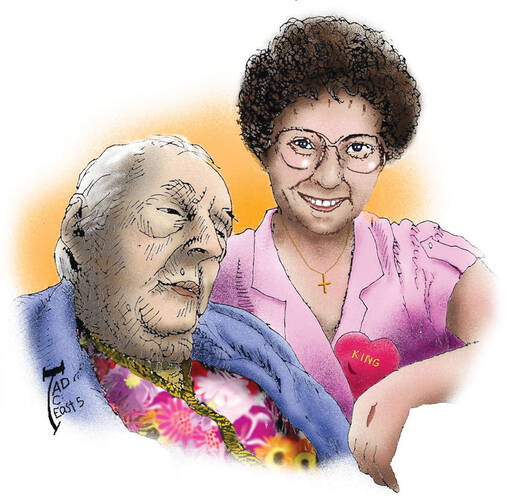Love Without Ceasing
In preparation for his crucifixion, resurrection and ascension, Jesus instructed his apostles on what their continuing mission would be when he was gone: “I give you a new commandment, that you love one another. Just as I have loved you, you also should love one another.” This translation of the simple Greek passage, however, fails to reproduce an interesting element. Each of the secondary clauses is introduced by the Greek conjunction hina, which is usually translated “so that” or “in order that.” Furthermore, the Greek text is all one sentence.
The passage also could be translated, “I give you a new commandment, in order that you love one another, just as I have loved you, so that you also love one another.” The conjunction hina points to the unity of the mission task and the desired goal of Jesus’ commandment: you are to love in order to attain to love. Jesus concludes his commandment saying, “In this way, all will know that you are my disciples, if you have love for each other.” Love is not just the commandment, but the fruit of the commandment.
In the same way, love is the fruit of Easter. It is God’s love poured out for us that enables us to love one another. It is love that flourishes, however, not because suffering and pain have been banished in our present lives but in spite of the very real suffering we experience to the present day. Paul says to the early Christians in Galatia, “It is necessary for us to undergo many hardships to enter the kingdom of God.” Paul and the early Christians were able to follow a rocky path with hope and faith because of the love they experienced in their midst through Christ.
This same love is able to sustain us still today as a foretaste and sign of the kingdom of God. All of us have suffered pain and loss, and all of us bear the scars of hurt; but it does not diminish the reality of anyone’s suffering to say that some in the past and some today have suffered more than others. There are so many today who have experienced abuse, slavery, rape and degradation for whom all seems lost. We must, of course, identify with all those who have suffered and who continue to suffer all forms of heartbreak day in and day out. We must work to change the conditions that allow such suffering to take place. Yet for all that we do, suffering mars lives and stalks survivors through endless days and nights. How can they know the healing power of love? The only way to know love is to experience it.
Only love can heal the wounds of injustice, however they are acquired. Injustice and evil leave deep scars on the soul that justice alone cannot heal. Justice can create good order and punish wrongdoers, but it cannot restore the soul to love. The irrationality of sin and evil leave behind time-bombs of antagonisms and hatreds, and nothing can heal these absurdities but love. Hope encourages us that against present evidence, life is worthwhile; faith instructs us that the solution to sin and suffering is available to all; but only love “will wipe every tear from their eyes.”
When hope and faith pass away, Paul says in 1 Corinthians 13, love alone remains, the only theological virtue that is eternal. Love is the core of God’s very being, the heart of Christ’s incarnation, the comfort of the Holy Spirit and the purpose and result of our Christian life as disciples of Jesus. This is why Revelation describes heaven as life in the presence of God’s love: “Behold, God’s dwelling is with the human race. He will dwell with them and they will be his people and God himself will always be with them as their God. He will wipe every tear from their eyes, and there shall be no more death or mourning, wailing or pain, for the old order has passed away.” As we await God’s establishment of the new order, which is love, it is the task of the Christian to prepare by combating the old order through love. Once again our mission is the same as our goal: “Just as I have loved you, you also should love one another.”
This article also appeared in print, under the headline “Love Without Ceasing,” in the April 22, 2013, issue.








